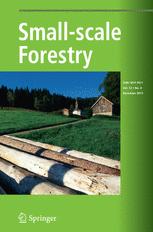Description
Journal article by Tatyana B. Ruseva, DPDF 2008 Human Dimensions of Global Environmental Change co-director Tom P. Evans, and Burnell C. Fischer in Small-Scale Forestry.
Social networks play an important role in the communication of information among forest owners and how owners process that information in making land management decisions. This article examines variations in the social network characteristics of family forest owners using survey data and interviews with 42 owners in south-central Indiana. We examine how network structure and content vary by harvesting activity, information sources, ownership attributes, sociodemographic characteristics, and location. Quantitative measures of network size and diversity, along with a qualitative understanding of network content and function are discussed and compared for active and passive forest managers. We find that active managers (people who had a recent timber harvest) had at least twice as many social ties related to forest management compared to passive managers, particularly after accounting for parcel ownership size, forest area, and total landholding size. Learning and service were the main functions of these networks, with learning being the most frequently cited reason for talking to others regardless of the management profile of forest owners. The study contributes to a growing interest in mixed-methods approaches to network studies and research on social networks in private forestry.

